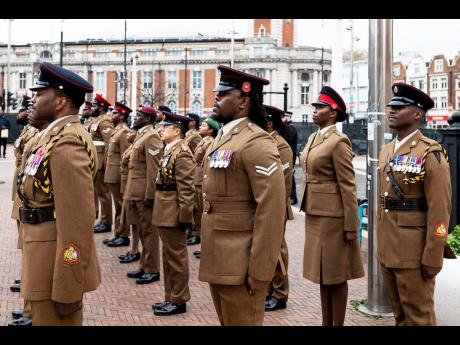Search on for J’can WWII vet’s family before funeral in England
LONDON, England:
An appeal is being made to find family and friends of a deceased Jamaica-born Royal Air Force (RAF) veteran before his funeral on Wednesday, March 29 in London.
Sergeant Peter Brown was one of the last West Indian members of the RAF living in the United Kingdom to engage in World War Two. The former military man died at his home in Maida Vale, west London, in December 2022, at 96 years old.
Following Brown’s death, RAF and Royal Air Force Membership (RAFA) personnel, along with black history enthusiasts, have made strenuous efforts to contact the former pilot’s family and friends.
Vince McBean, president of the West Indian Ex-Serviceman Association, is confident the former RAF man will receive an appropriate commemoration from former and current military members across the UK.
McBean, who was the West Indian Ex-Serviceman’s Association chairman for 12 years before becoming its president, said, “We are confident that someone will respond to the appeals being made. The feedback from the black community has been very positive, with various organisations sharing details of our appeal.
“Peter’s death may not be known by some of his biological family, but he is known by military service personnel, who will organise a special commemoration for him.”
Brown’s funeral will feature a full guard of honour, with two rows of military men accompanying the coffin, as it enters Mortlake Crematorium, in Richmond Upon Thames. The flags of the British West Indies Regiment during World War will also be raised during the funeral. But the ex-serviceman’s death has again raised the issue of the attention being paid to the welfare of veterans of the UK’s armed forces.
McBean believes a growing number of former military staff from the Caribbean, living in the UK, are at a disadvantage given the scant resources available to organisations like the West Indian Ex-Serviceman’s Association, now rebranded as the West Indian Association of Service Personnel (WASP), which often must assume responsibility for their care. The group aims to represent the interests of the British armed forces community, particularly those having African and/or Caribbean ancestry.
The organisation frequently makes small financial contributions to individual members of the armed forces community in relation to needs arising from immigration applications/appeals, emergency housing, living and bereavement expenses.
The association also provides members of the armed forces community with access to a free daily luncheon club, weekly food parcels from the WASP Veteran’s Food Bank, health and well-being advice and activities, and weekly social events to help reduce loneliness and isolation.
McBean said despite this some areas still need attention. “We don’t have our own properties to house ex-servicemen, who are black, and consequently many have died under unfavourable circumstances.
“Cities across the UK, especially London boroughs, should provide resources so that ex-servicemen from the Caribbean can enjoy association with those of a similar culture. Unfortunately, often we are left to fend for ourselves. I hope something beneficial can come from the demise of Peter Brown,” he said.
Neil Flanagan, a former RAF technician, who worked on aircraft instruments and bomb sites during World War II, is not surprised at reports of the difficulties some ex-servicemen experience.
The former technician, who joined the RAF in 1943, believes some former military men and women isolate themselves. He said, “Some do not mix with other military personnel after their retirement. Occasionally, former sergeants do not mix with those who are lower in rank, and view them as commoners.
“Other former staffs want little to do with associations, like WASP, possibly because they shy away from annual membership fees.”

